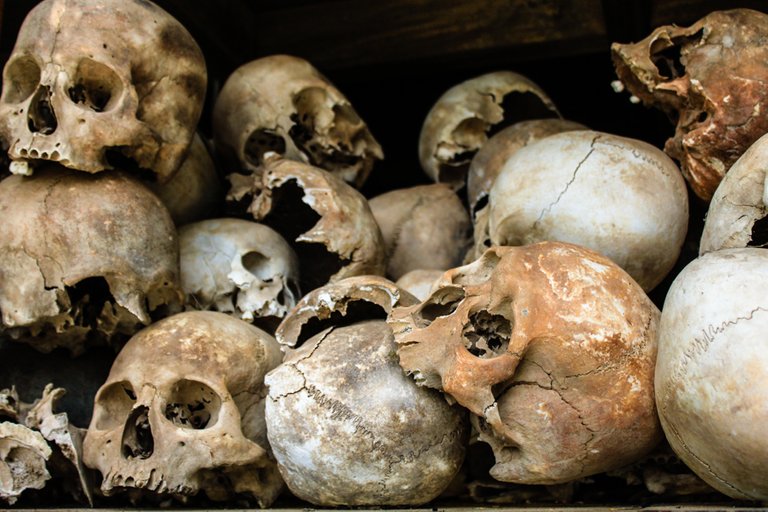There’s a sign beneath the branches marking the “KILLING TREE / AGAINST WHICH / EXECUTIONERS / BEAT CHILDREN,” and overhead, the cicadas scream their sickening testament to terrors past. It’s but one of many the Khmer Rouge used to bash baby brains in, holding helpless infants by the ankles, swinging them face-first into the blood-stained trunk. More signs mark mass graves; here are the headless, there those buried alive, tortured, raped, and chemically burned. A memorial stupa securing seventeen stacked tiers of shattered skulls, broken bones, and bits of tattered clothing stares down upon the savage scene. Incense sticks smoke below its base while rows of cigarettes sit unlit beside the shells and shag tobacco offered before scores of half-crushed craniums.

Two little girls live inside this killing field. Their mother watches while they draw figures in the dirt, giggle, and guard their art from the inadvertently ruinous cleats of mourners and tourists alike, innocent and enthusiastic enough to encourage a glimmer of hold-out hope for the future, even here, at Choeng Ek, upon genocide-drenched grounds far too repulsive to redeem.
I eventually make my way back to the tuk-tuk, accosted by amputees and urchin children competing for sympathy and donations. I surrender the few dollars and riel from my front pocket and watch, frustrated, as they argue over who received most, demand more, then run back to hand the cash to their parents, who’re sitting in the shade playing cards across the dusty dirt lot. I tell my driver, Phal, to take me to the dump at Stung Meanchey, an industrial neighborhood on the southwestern outskirts of Phnom Penh with a substantial orphan population. He warns me we shouldn’t go there, but eventually grants the request after I rudely remind him I know very well what the going rate for this trip is supposed to be, and agreed to pay more because he spoke enough English to communicate clearly.
We pass an avenue lined with bakeries and, deciding bread is easier to divide than the better-valued rice I intended to buy, tell him to turn around and stop off at the last. I have no idea how many children lurk round the landfill, so I reach into my back pocket and hand over the cash for an order of ninety French baguettes, figuring I can pay for a return trip and bring more if overwhelmed. When we reach the edge of the wasteland, there are only a dozen people and a small herd of goats sifting through the reeking rubbish for food and recyclables. Most motion gratitude; the rest reach out, grab their loaves, and run off; fair enough. Soon they go back to their business and I ask Phal to go further, but he refuses, saying we’ll be robbed, or worse. I ask if we can at least drive to the top of the hill overlooking the scene, and he reluctantly agrees, but we’re chased off by a shirtless, stick-waving, garbage-chucking man (with no apparent interest in baked goods) before we can reach the smoldering summit.
Phal can see that I’m more discouraged than usual, and he offers to take me to his home which, he says, isn’t far from our current coordinates. I jump at the opportunity, and ten minutes of alleyway twists and turns later, we stop along a string of shacks in a stinking, putrefied slum as filthy as the dump we’d departed. It’s awkward for a few moments as the cautious, quieted community looks on, understandably bewildered, if not suspicious as to what I’m up to. Mercifully, a smiling, snot-nosed boy breaks the silence, shouting a hearty “Hello!” His father hushes him, but I beam back and wave, first to him, then the rest, “Hello there!”
They all burst out laughing, and before I can react, two men charge at me, clutch my hand, shake it, and dart back into the crowd, howling hysterical amusement. I chuckle along with them, and open the bags of bread, motioning everyone over. I try to keep the pushing and shoving under control, and happily manage to distribute the contents amongst all children, adolescents, and elderly in sight, along with a decent number of adults; about eighty people, all told. Seeing them flash their appreciative smiles feels wonderful beyond words, but I won’t lead myself or anyone else on pretending the meager meal accomplishes anything more than a most-temporary hour or two of relative relief; the only true chance these children have to escape this hellhole is an education, typically too elusive and expensive to pursue.
Once the bags are empty, I meet my driver’s beautiful family, from six month-old son to mother-in-law, and a group of guys break out the boombox and invite me to join their moonshine and mango party. Some kids gather together, wanting their photo taken. I oblige, of course, and my heart melts as they marvel at themselves in the camera’s review screen.
I walk around a while with them in tow, brainstorming, wishing I had immediate means of more lasting impact, and my driver calls me, saying we should head back; it’s getting darker. After one last drink and slice, I climb back into the cushioned seat, wipe away sweat and tears, and cut the still-sweltering heat of Cambodian twilight waving goodbye. The neighborhood watches the tuk-tuk lumber away, leaving them for the forty-minute ride back to the cool comfort of my air-conditioned hotel room at the riverside, which waits for me, lights-on, locked and secure, at sixteen degrees Celsius.